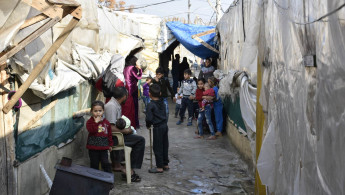Amnesty urges EU leaders to protect Syrian refugees facing abuse in Lebanon
As the eighth EU Ministerial Brussels Conference on "Supporting the Future of Syria and the Region" begins on Monday, Amnesty International has urged world leaders to commit to protecting Syrian refugees in Lebanon.
The global human rights group warned in a statement on Sunday that Syrians in Lebanon were faced with forcible deportations and human rights abuses amid a recent escalation in restrictive measures by Lebanese authorities.
The group urged the donor governments meeting in Brussels, especially the European Union (EU) member states, to ensure that any funds pledged to support Syrian refugees in Lebanon do not contribute to human rights abuses.
On May 2, European Commission President Ursula Von Der Leyen announced a one billion euro aid package to Lebanon, with a portion earmarked for strengthening Lebanese security services to curb irregular migration through the Mediterranean.
Shortly after, on May 8, Lebanese General Security implemented new measures against Syrian refugees, including restrictions on residency permits and employment, coupled with raids, evictions, arrests, and deportations.
"President Von Der Leyen's focus on limiting refugee flows to Europe has seemingly encouraged Lebanese authorities to intensify their crackdown on refugees," Aya Majzoub, Amnesty International’s deputy director for the Middle East and North Africa, said in the statement.
"Despite Lebanon hosting the largest number of refugees per capita amid an economic crisis, European states should show solidarity by increasing resettlements of Syrian refugees from Lebanon."
Amnesty highlighted in its statement the dire conditions faced by Syrian refugees in Lebanon.
Over the past two months, Lebanese authorities have ramped up hateful rhetoric and restrictive measures against around 1.2 million Syrians living in the country aimed at pressuring refugees to leave.
These measures include discriminatory curfews, closure of businesses run by Syrians, and suspension of residency renewals through various means.
The General Security Office has also resumed organising "voluntary and safe" returns of Syrian refugees, with more than 400 refugees deported on May 14.
Refugees interviewed by Amnesty described living in constant fear.
One Syrian man, who was trying to renew his family's residency permits, told the rights group: "We don’t work; we tried to be legal but failed repeatedly. Now we are in hiding."
The crackdown leaves many refugees without legal status, making them vulnerable to arrest and deportation.
Currently, 83 percent of Syrian refugees lack residency status, and 90 percent live below the poverty line.
According to the UN refugee agency, 13,772 individuals were deported or pushed back to Syria from Lebanon in 2023. The agency added that at least 27 municipalities in Lebanon placed restrictions on Syrians' ability to reside there.
Rights groups have consistently documented abuses committed against Syrians who return to Syria at the hands of regime security forces, including sexual abuse, torture and murder.
Deporting people to areas where they face a credible fear of torture or other dangers is illegal under the UN Convention Against Torture.
A Syrian mother of two told Amnesty: "If there was a safe zone in Syria, I would be the first to return. The regime is not safe for us."
Majzoub stressed: "No part of Syria is safe for refugee returns. Lebanese authorities must halt the deportations and lift the restrictions, while the EU must uphold its legal and moral obligations to protect refugees."





 Follow the Middle East's top stories in English at The New Arab on Google News
Follow the Middle East's top stories in English at The New Arab on Google News


